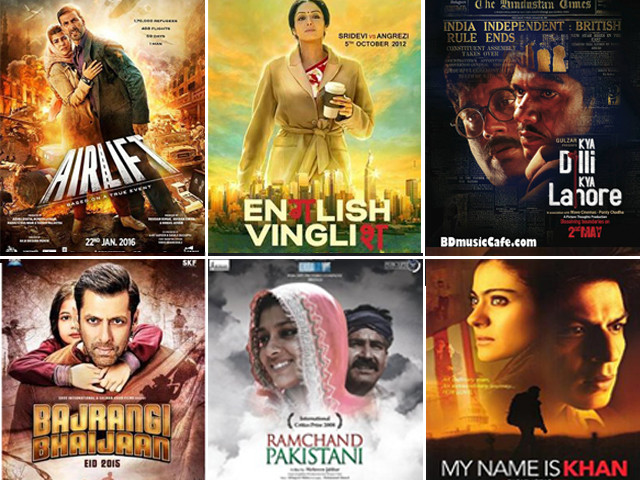The recently released Bollywood movie Airlift, based on the evacuation of Indians residing in Kuwait during the Gulf War of 1990, has won much acclaim in both India and Pakistan. Rightfully so, for its brilliant cinematography, outstanding performances by all the artists (especially Akshay Kumar who has steered away from typically playing romantic comedy or action roles) and its excellent screenplay. The tragic scenario of a war zone and how it can take away everything you have is depicted in a heart-rending manner, along with how man’s survival skills are put to the test.
The apathy of many politicians and bureaucrats, as is expected in our part of the world even in times of such dire crisis, has been highlighted very well. India’s Ministry of External Affairs has issued a statement to the effect that this part of the film is untrue, even though the party in power back then was different from the current one as some critics have pointed out as well. The film also demonstrates how such situations ignite the sensitive or empathetic side of some people, not seen in them earlier.
As an Indian, I must say that one of the Indian things that many Pakistanis, along with many other South Asians, do identify with is Bollywood. I remember back in 2003, I had gone with my family for a trip to Mauritius. While waiting in the lounge, we noticed Akshay Khanna there too, as did several others in the lounge. Interestingly, one of India’s pharmaceutical giants Mr Yusuf Hamied who runs the company Cipla was also present there.
My father and I decided to take a stroll in the airport, as our flight was delayed and we stumbled upon a young Pakistani who asked us if there was any Bollywood hero at the airport, for he had heard something to that effect. I mistakenly told him that Akshay Kumar instead of Akshay Khanna was in the airline lounge. He thanked me and rushed to procure his autograph
Later in 2006 some students from the Lahore Grammar School visited my school in Delhi (Modern School Vasant Vihar) in an exchange programme and even attended our student-organised farewell party for the batch that was to graduate. They danced to Bollywood songs, mouthing the lyrics with utmost ease. These instances constituted my initial exposition to the level of popularity that Bollywood enjoys in Pakistan.
Later I learnt that Bollywood actresses such as Juhi Chawla and Kareena Kapoor had even done Pakistani television advertisements. Yes, Bollywood, like any other film industry, has produced the trashiest of films. Personally, I regret having watched the likes of Jhoom Barabar Jhoom and Ek Deewana Tha, but it has also produced many excellent films such as classics and other critically acclaimed films like Airlift. Apart from this, it has produced other light films that are fun to watch and overall aren’t bad at all.
Bollywood has also been a symbol of Indian pluralism, even more than our cricket team. It has more appeal across the gender divide and provides opportunity to Anglo-Indians, such as Barry John, India’s tiny Jewish minority, those from certain provinces in India’s north-east where cricket isn’t particularly popular, for instance Danny Dengzoppa and even the Indians who are inherently Chinese, like Chang.
A few Bollywood films have had very jingoistic or derogatory remarks towards Pakistanis as people, which is completely wrong. However, in most cases, the expression of a patriotic Indian sentiment and the presentation of an Indian narrative (be it in war movies or even any other genre), while being very critical of the Pakistani establishment, doesn’t translate into bigotry for the average Pakistani.
This can be seen in movies such as Border which shows the hero saluting both the Indian and Pakistani flags and wishing for peace to prevail, as well as Gadar which shows the protagonist as willing to say ‘Pakistan Zindabad’ (but refusing to say ‘Hindustan Murdabad’). This movie also presents a Pakistani Muslim friend of his being of great help. Even the movie Phantom features Pakistani Muslims helping Indians in fighting terrorism without any incentives.
Main Hoon Na showed Indian security forces combat Indian jingoists obstructing a peace initiative with Pakistan. Besides, many other movies like English Vinglish, Namaste London, London Dreams, Goal and several others have showcased friendships between those hailing from India and Pakistan among those settled overseas. The movies Filmistaan and Kya Dilli Kya Lahore have focused on the theme of peace and friendship between Indians and Pakistanis and both the movies are absolutely brilliant.
Bajrangi Bhaijan, in fact, went to the other extreme in terms of trying to convince Indian Hindus to abandon any form of radicalism and embrace peace (overlooking the biases that it can subtly feed in Pakistani/non-Indian audiences) by exaggerating every practising Hindu character in India as casteist and Islamophobic. As a Hindu, this made me feel somewhat uncomfortable, although I know that the intention was not to offend.
Equally, I must also emphasize that the Pakistani film Khuda ke Liye was highly acclaimed in India. I myself have watched that movie four times over, in spite of my reservations over some dialogues like one wherein the innocent Pakistani musician on being asked by an American official why all terrorists are Muslims even if the vice versa isn’t true, instead of rebutting the fallacious notion of terrorism being a Muslim monopoly, further goes on to describe all Muslims globally as a nation. And that too, he describes Muslims as being the only nation that has been subjected to injustice, as if no non-Muslim has ever faced injustice anywhere and as if to rationalize to a certain extent, though certainly not justified, terrorism. However, on the whole, the film offers a brilliant take against terrorism and religious autocracy. I even made it a point to show it to a devout Muslim gentleman who is an alumnus of the Deoband Madrasa and who comes to my home to teach me Urdu (a language that I wish to learn out of sheer interest), and he loved the movie overall too.
Though, on the whole, the film offers a brilliant take against terrorism and religious autocracy. I even made it a point to show it to a devout Muslim gentleman who is an alumnus of the Deoband Madrasa and who comes to my home to teach me Urdu (a language that I wish to learn out of sheer interest), and he loved the movie overall too.
Ramchand Pakistani and Bol were also acclaimed in India and again, rightly so in my opinion. I personally found the Pakistani movie Shararat (2003) pretty decent. From Pakistan, more than films, television serials have become a talking point in India and Zindagi, a channel showcasing Pakistani serials, has been a massive hit, as have been some serials in earlier times too. Pakistani comedians such as Shakeel Siddiqui and Umer Shareef have also won the hearts of many Indians.
These films and serials have played a positive role in highlighting our similarities in leading day-to-day lives and dispelling prejudices about ‘the other’. For instance, a fellow Indian who had never travelled abroad and who didn’t go to a very elite school once related an incident to me. He saw a certain Pakistani serial depicting a jeans-wearing, married, working Pakistani woman with male friends which he had thought of as unimaginable, but the serial changed his perception for the better.
Personally, I am not very optimistic about dialogue between the governments of India and Pakistan until some structural changes take place in governance patterns so that horrendous occurrences like the militant attacks at Gurdaspur and Pathankot do not keep recurring. But I do believe that person-to-person contact and cultural exchanges must be allowed to continue, as far as possible, for a brighter future. There are those creating obstacles in the same, like the Shiv Sena in India, but I believe that their goons do not represent the spirit of Mumbai. The spirit of Mumbai is better represented by the many Mumbaikars crowd-funding the medical treatment in a Mumbai hospital of a Pakistani girl Saba suffering from the Wilson’s disease.
Similar humanity was exhibited by the Edhi Foundation in Pakistan, which took care of the disabled Indian girl Geeta. She was left behind in Pakistan and this particular Pakistani trust even constructed a Hindu temple for her. And yes, there’s also the Burney trust, which paid the ransom to Somali pirates for the release of Indians
In fact, even in the context of the relatively recent controversy about Ghulam Ali’s concert; while the recent actions by Shiv Sena are undoubtedly condemnable, why overlook his numerous concerts in India over the years, or an invitation for a concert in Delhi by Chief Minister Arvind Kejriwal and Prime Minister Narendra Modi meeting him?
Although I am not an uncritical admirer of Modi, I would like to point out his victory in the national elections with a vote-share of less than 40 per cent was a result of a very justifiable anti-incumbency sentiment. This was a result of Indians being upset over the increasing inflation and unemployment, coupled with him portraying an image of embracing religious pluralism, leading even a sizable number of Muslims to vote for him. However, over 60 per cent of Indians, irrespective of religion, did not vote for him but were not united on an alternative.
This also reminds me of how Shiv Sainiks’ opposition to the movie My Name is Khan, owing to Shah Rukh Khan’s remark on Pakistani cricketers vis-à-vis the Indian Premier League, didn’t lead most Indians to boycott the film. The boycott calls from sections of the Hindu right for Haider and PK hardly had much impact either, though I appreciate them not resorting to vandalism on these occasions. My name is Khan proved to be a blockbuster, just like Indian films continue to be popular in Pakistan, despite the rants of some extremists.
And yes, in this regard, the official ban of Haider in Pakistan came as a shock to me. It was screened in India peacefully, despite being very critical of human rights violations by rogue elements in the Indian security forces within Kashmir, which certainly deserve condemnation.
Similar allegations exist regarding Pakistani security forces in Balochistan, levelled by the very same international human rights organisations that level them for their Indian counterparts. Believing only what we would like to in either case would be sheer confirmation bias. The film Haider, while primarily being critical of the Indian state machinery, also made some passing references critical of Pakistani policies, which led to its ban in Pakistan, but the criticism of those Pakistani policies is indeed genuinely advanced by Kashmiris on both sides of the LoC.
I, for one, like very many other Indians, am a fan of Atif Aslam. The memory of a night in February 2008 will remain amongst my most pleasant ones. I had attended a certain concert of his in Ahmedabad with college friends. I am indeed glad Bollywood gave Rahat Fateh Ali Khan, Ali Zafar and Fawad Khan a chance to showcase their talent.
Ali Zafar won me over when he was moved to tears over a question put forth to him. He was asked about the love he received from the people of India and Pakistan and what he makes of the hostility between the two countries. He gave a fitting response to a Pakistani actor when asked why he works in an enemy country. His reply is indeed worth pondering over, which was we should strive for less bloodshed and more music.
Yes, indeed.
India and Pakistan both share the spirit of Bollywood
We should strive for less bloodshed and more music.



COMMENTS
Comments are moderated and generally will be posted if they are on-topic and not abusive.
For more information, please see our Comments FAQ